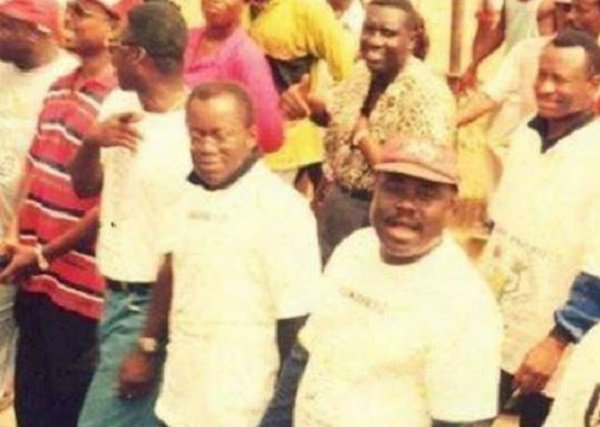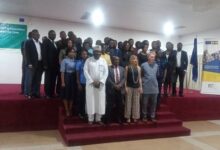
Though Ghana’s struggle for independence was not a walk in the park, a walk in the Nationalism Park at Osu, Accra, leads visitors to three busts mounted in remembrance of Sergeant Peter Adjetey, Corporal Otam Attipoe, and Private Odartey Lamptey.
The three ex-servicemen were on February 28, 1948 shot dead by the colonial police led by British Police Superintendent Collins Imray, while a group of ex-soldiers were marching peacefully to the Osu Castle to present a petition to the then Governor Sir Gerald Creasy, over their unpaid war allowances.
On the anniversary of the incident, every year, a wreath-laying and flag-raising ceremony is held at the park in remembrance of what has come to be known as the “Christianborg Crossroads shooting” or the “1948 Accra Riots,” which was the landmark incident that provoked a major strike and a call for an end to colonial rule, sparking the struggle for independence at the time.
Sixty-six years after the country’s independence, protests and demonstrations remain a vehicle for freedom of expression and allow individuals to unite in support of a common belief—to express their opinions, voice their frustrations, criticize, and voice opposition to opinions or beliefs they do not share.
The Obra Spot at the Circle in Accra (where the Kwame Nkrumah Statue stands) has become famous for protests. From time to time, protesters clad in red and welding placards converge there to begin their protests. This article highlights some of the protests.
1992 CONSTITUTION
Chapter five of the 1992 Constitution of Ghana contains human rights provisions, the free exercise and enforcement of which form the very bedrock of Ghana’s democracy.
Article 21(1)(d) states that “All persons shall have the right to freedom of assembly, including the freedom to take part in processions and demonstrations.”
The right to freedom of assembly entails the ability to protest in a peaceful manner and covers all types of gatherings, including marches, processions, rallies, and static protests.
This right serves as a platform for political opposition and a break from authoritarian forms of government that forbade the expression of such rights, making it a necessary precondition for the realization of true democracy.
THE PUBLIC ORDER ACT
In the New Patriotic Party (NPP) v. Inspector-General of Police [1993-94], the Supreme Court unanimously concluded that sections 7, 8, 12, and 13 of the Public Order Decree were in contravention of Article 21(1)(d) of the 1992 Constitution and were therefore unenforceable.
In just about a year after the verdict, Parliament enacted the Public Order Act of 1994 (Act 491), apparently seeking, albeit purportedly, to bring its provisions into conformity with the 1992 Constitution.
The relevant portions of the Public Order Act may be summarized as follows: that any person who desires to hold any special event in any public place should notify the police not less than five days ahead of the special event.
It empowers the police to request the organizers to postpone the event to any date or relocate; if they fail to do so, the police officer may head to court for an order prohibiting the holding of the special event.
Section 10 of the Act defines “special event” to mean a procession, parade, carnival, street dance celebration of traditional custom, outdooring of a traditional ruler, demonstration, public meeting, and similar event.
KUMEPREKO DEMO
The ‘Kumepreko’ is an Akan expression that means “You might as well kill us”. It was a protest against the Rawlings’ administration on May 11, 1995, on the introduction of the Value Added Tax (VAT) initiative.
Those at the forefront of this protest included President Nana Addo Dankwa Akufo-Addo and other activists such as Dr. Charles Wereko Brobbey, Kwasi Pratt Jnr, and Abdul Malik Kwaku Baako, and Akoto Ampaw.
It is considered the biggest and most impactful demonstration in the fourth republic because the hindrances posed by the Ghana Police Service when the idea was mooted, compelled the NPP to seek redress at the Supreme Court between 1993 and 1994, leading to the quashing of the Public Order decree and the birth of the Public Order Act.
The demonstration was initially billed as a peaceful protest but quickly became violent when unidentified assailants shot live bullets into the crowd, resulting in the deaths of some of the protestors.
WAHALA DEMO
Ten years down the road, the Wahala demonstration came. Wahala is an African word commonly used in Nigeria to express a state of worry, distress, problem, or trouble. The demonstration was organised by the Committee for Joint Action (CJA), a non-partisan group, on March 1, 2005, against fuel price increases and general hardship in the country.
The demonstration, which featured former Communications Minister Dr. Edward Omane Boamah (then spokesman for the committee and a final year medical student), comprises a number of opposition political parties, democratic organizations, and civil society groups.
AFAG DEMO
Between 2009 and 2010, the Alliance for Accountable Governance (AFAG), a pressure group, led a series of protests to embark on a demonstration against what they described as “the worsening economic situation in the country.”
In August 2009, one such demonstrations was to protest against the governments “harassment and intimidation of its opponents and the deteriorating living conditions.
LET MY VOTE COUNT
It was a demonstration, which some political pressure groups hoped would ratchet up pressure on the Electoral Commission (EC) to create a new voter’s register, but it turned violent on September 16, 2015, when some of the demonstrators deviated from the planned route.
The group of demonstrators, comprising the Alliance for Accountable Governance, Let My Vote Count, and the New Patriotic Party, had rallied hundreds of protestors in Accra to demand the creation of a new voter’s register. One person lost an eye while others were injured in the demonstration.
OCCUPY FLAGSTAFF HOUSE
The civil society group, Occupy Ghana, was born on July 1, 2014, out of the Occupy flagstaff demonstration which sort to express the frustrations of ordinary Ghanaian citizens over the state of the economy.
Organized by the Concerned Ghanaians for Responsible Government, about 500 participants occupied Flag Staff House, the office and residence of President John Dramani Mahama. It featured the likes of the current Finance Minister, Ken Ofori-Atta, who is currently being hounded for poor state of the economy.
‘DUMSOR; MUST STOP
It was the first demonstration to be convened by a woman, at least in the fourth republic. Actress Yvonne Nelson On May 16, 2015, led Ghanaians to storm the streets of the capital Accra to participate in a vigil meant to publicly protest against the energy crisis which was popularly known as “Dumsor”. The vigil was organized under the hashtag #DumsorMustStop.
FIX THE COUNTRY
What started as a hashtag on social media assumed a physical form on the streets of Accra on August 4, 2021, when hundreds of Ghanaians embarked on the #FixTheCountry demonstration.
The protest for good governance and the urgent fixing of the country’s challenges coincided with Ghana’s Founders’ Day, which is observed annually to celebrate the nation’s forebears led to the country’s independence from British colonial rule in 1957.
OTHER PROTEST
Other protests worth mentioning are Drop that Chamber, Yentua demo, Arise Ghana demo, Ejura protest, Kumepreko reloaded and the recent picketing of pensioners over the domestic debt exchange. Labour unions, law students and other identifiable groups have also staged protests across the country.
Commenting on the security implications of the increasing protects , a security analyst, Dr. Festus Aubyn, said that in terms of democratic rights and freedom of expression through protests, Ghana had done better than many African countries.
He, however, expressed concern over the violence that was often orchestrated by the police, protesters, and sometimes clandestinely by the government in power.
He said tackling the violence was crucial because of the implications it had, including permanent injuries, theft of personal items, and destruction of property usually belonging to the state.
While advising protestors to be guided by the rules regarding protests and conduct themselves properly and in a peaceful manner, he urged the police to use intelligence to identify potential violent or aggressive members within the protest group and deal tactfully with the issue.
Writer’s email: j.nathandonkor@gmail.com
BY JONATHAN DONKOR






